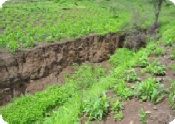| Stakeholders and their sustainability goals |
 |
|
The area and people
Added value of DESIRE for stakeholders
There is a high willingness to participate and community leaders were very supportive.
Study site stakeholder workshops
Limitations for spontaneous implementation of soil and water conservation practices
Stakeholder groups
Sustainability goals The Boteti area is confronted by problems that pose a challenge to the attainment of the three sustainable development goals of ecological (environmental) integrity, economic (livelihood) efficiency and social equity. Several indicators support this claim. Thus, sustainability goals for the Boteti relate to securing livelihoods and environmental protection aligned to poverty alleviation. In this regard, through WOCAT workshops, land users identified several interventions that had potential to meet sustainability goals in their area. These were game ranching, water harvesting, biogas production and utilization and solar power utilization. This report discusses the opportunities (and constraints) associated with these interventions, partly as revealed by WOCAT workshops (e.g. Boteti Stakeholder Report No. 2).
Source: Stakeholder workshops.
|
|||||||||||||||
Study sites

Acknowledgement
The DESIRE project was
|
DESIRE brought together the expertise of
26 international research institutes
and non-governmental organisations.
This website does not necessarily
represent the opinion of the
European Commission. The European
Commission is not responsible for
any use that might be made of the
information contained herein. 

